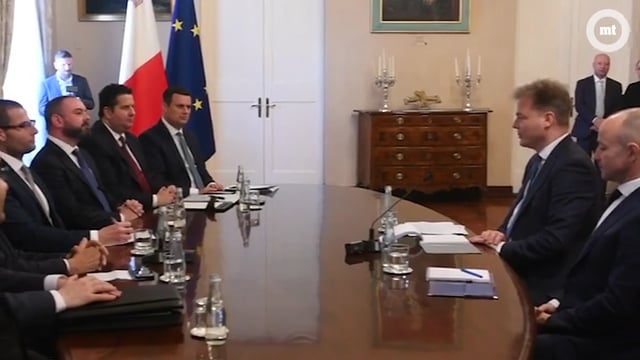[WATCH] Pieter Omtzigt points finger at former justice minister: 'Reforms were not put in place'
Council of Europe special rapporteur Pieter Omtzigt says necessary changes to Malta's rule of law framework were not put in place when Owen Bonnici was justice minister


Pieter Omtzigt has lamented that recommendations made to Malta by the Venice Commission and other international bodies were not put in place under the Joseph Muscat administration.
The Council of Europe special rapporteur specifically pointed to Owen Bonnici in a face-to-face encounter at Castille this morning, saying that during his term as justice minister the changes to the country's rule of law framework were not implemented.
Omtzigt, who is in Malta for a two-day visit that started yesterday, met with Prime Minister Robert Abela, and ministers Edward Zammit Lewis, Byron Camilleri, Edward Scicluna, Bonnici and parliamentary secretary Stefan Zrinzo Azzopardi.
He said that there was a considerable delay in implementing recommendations from the Venice Commission, Greco and Moneyval, remarking that it is only now that they are starting to be put in place, despite Muscat having committed himself to implementing the Commission's recommended changes when he was prime minister.
"Some serious things were wrong with the rule of law system in Malta," he said, highlighting that he had not been appointed as special rapporteur on the matter "by accident".
"I am looking at you Mr Owen Bonnici. You had been justice minister for two years and I had not seen the results which Dr Abela now announced… I am happy some of [the recommendations] are being picked up now, but there has been a considerable delay," he said.
Malta, he said, was active "in every sector of the economy which is high risk", such as Bitcoin, gaming, or selling passports "to people who sometimes have a very dodgy reputation."
In this respect, Malta had a "serious problem", he said, as he underscored that it was only the third time in the Council of Europe's 75-year history that a rapporteur had been appointed because of a particular case: Daphne Caruana Galizia's murder.
"[She] was killed in a horrible car bomb and you haven't mentioned her," he said, adding that he was still waiting for some of the comments made by the government in her regard to be retracted.
On his part, Prime Minister Robert Abela said the government "will leave no stone unturned" to ensure a robust rule of law system.
He emphasised that changes were being made, such as a change in the method of appointing the police commissioner, a separation if the Attorney General's dual roles through the appointment of a State Attorney, and transferring the police's prosecutorial role to a public prosecutor.
"And we are looking further than that - we are following the Venice Commission's recommendations and also those made in your report," he said, referring to Omtzigt's critical report on the rule of law in Malta.
"I acknowledge we had issued which tainted our reputation," Abela said, stressing that the government would not drag its feet in implementing the recommended changes
He conceded that more still had to be done but was satisfied with the work the government had done in the past month since he became prime minister.
"We are doing what we are doing in good faith, as we are convinced we need a good rule of law system and a state based on good governance to complement a robust economy, " Abela said in his closing comments.








.jpg)




.jpg)






.png)


